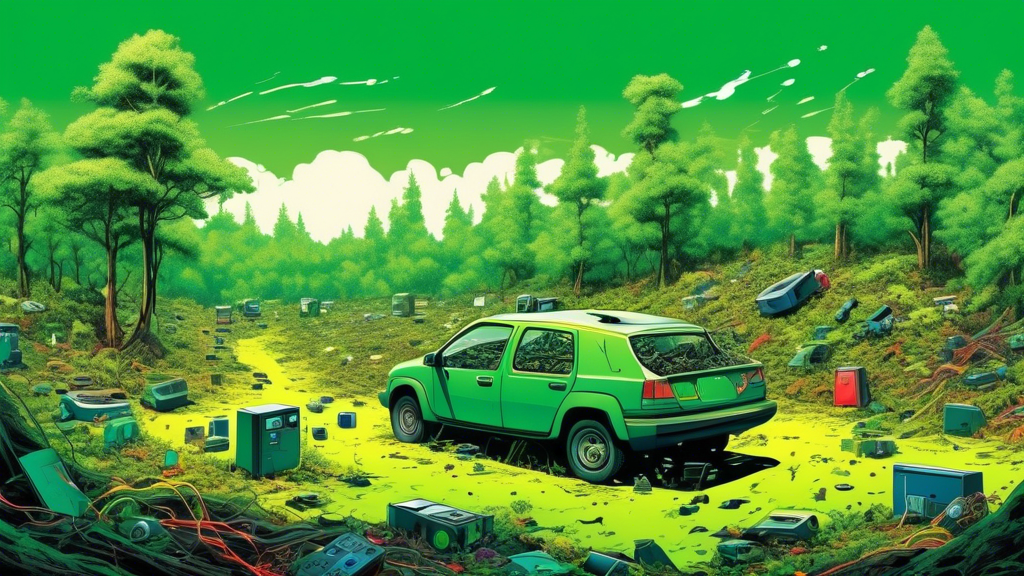
The Surprisingly Complex World of EV Batteries and Environmental Impact
Ever wondered if driving an electric vehicle (EV) makes you a climate hero or if it’s just a zero-emissions façade? Like most things, the answer isn’t black or white but a shade of eco-greenish gray. Let’s plug into the environmental narrative of EV batteries and discover the true impact of EV batteries on the environment. Are electric cars really as environmentally friendly as they are often portrayed to be?
The Heart of the Matter: What Exactly Are EV Batteries?
First off, let’s talk about what powers your electric car. Essentially, EV batteries are like the energizer bunnies of automobiles—they keep your vehicle running without the need for dinosaur juice (a.k.a. petroleum). Today, most EVs run on lithium-ion batteries, the same technology that powers your smartphone or laptop, but on steroids.
Why lithium-ion? Well, they have a pretty good energy-to-weight ratio and can recharge faster than you can watch an episode of “Planet Earth.” Compared to other types of batteries, they are recognized for their longer lifespan. But before you crown them king, let’s look deeper into their environmental crusade or the lack thereof.
Mining for Trouble: The Raw Material Rundown
Ever think about where all the lithium for these batteries comes from? Mining, my friend, is not just lithium we’re digging up. Cobalt, nickel, manganese, and graphite play significant roles in battery production. The catch? Mining these materials often involves significant environmental disturbance, intense water usage, and troubling labor practices in less regulated regions.
For instance, extracting lithium involves pumping underground brine into ponds, left to evaporate for months. This process uses vast amounts of water and risks contaminating local water supplies. Got a tad more complex than you anticipated, right?
The Carbon Footprint Tango: It’s Complicated
It’s a popular belief that EVs have a smaller carbon footprint. That’s kind of true when looking at direct emissions—EVs produce zero—zilch—nada as they cruise down the street. However, producing the massive battery under the hood isn’t so clean.
The production of EV batteries is energy-intensive. From mining the raw materials to the actual manufacturing process, sizable amounts of CO2 are emitted. Some studies suggest that an EV must be driven tens of thousands of miles before its greener side starts to outweigh the dirty origins of its battery. However, don’t let this break your green dreams—the long-term environmental benefits still seem to overtake the initial emissions over time.
Recycling: The Ace Up the Green Sleeve
To mitigate some environmental burdens, stepping up our recycling game is crucial. Currently, the rate of lithium-ion battery recycling is a bit like the stats of your favorite underdog sports team—not great, but with potential for a big comeback. Why? Technology to effectively recycle these batteries is still in baby shoes, but it’s growing fast. Advancements in this area can help recover precious materials and reduce the need for fresh mining, easing our planet’s burden.
Moreover, companies are exploring second-life uses for EV batteries in energy storage systems, which can further extend their usefulness beyond the automotive industry.
Driving Towards a Greener Future
So, is riding the wave of electric vehicles towards a cleaner world a smooth drive? Not entirely, but the road does look promising. With advancements in battery technology, recycling, and cleaner production methods, the environmental impacts are poised to decrease.
EVs represent a crucial step towards diminishing our carbon footprint. They’re not perfect but an evolving solution to a pressing problem. As with any journey worth taking, there are bumps along the way, but the destination—a healthier planet—is undoubtedly worth the effort. Steering our efforts towards improvement can make the transition to electric transport as green as it’s meant to be.
You’re not just a driver when you’re behind the wheel of an EV—you’re part of a global pit crew, all working together to tune up our approach to sustainable transport. So, next time you pass a gas station and silently cheer for not stopping, remember that you are part of a bigger change. And that’s something to be charged up about!
